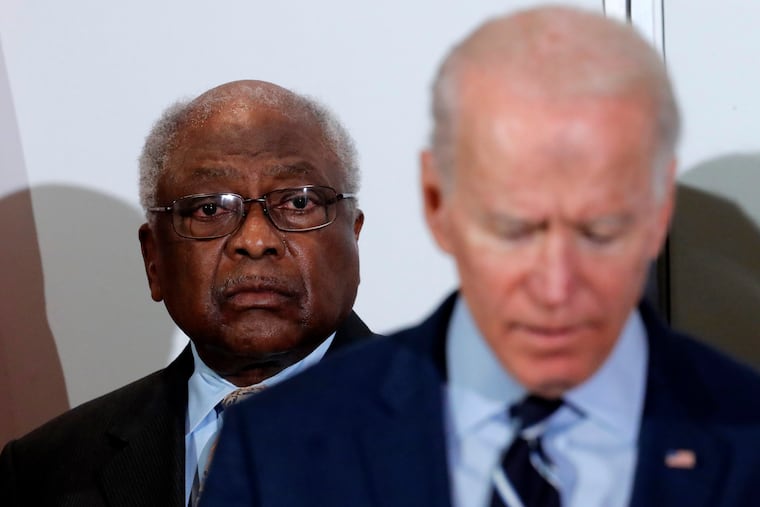Joe Biden didn’t earn my vote in 2020. But he can if he puts reparations on the table. | Opinion
American descendants of slaves need policies targeted specifically to their uplift.

While I voted for some Democrats in 2020, I didn’t vote for Joe Biden. Instead, I focused on local and state races and supported U.S. Rep. Madeleine Dean based on her previous support for a commission to study reparations for the descendants of slaves, which can meaningfully uplift targeted Black communities.
I focused downballot because, for the umpteenth time, a Democratic presidential candidate expected Black voters to show up for him without any specific policies that help them — particularly American descendants of slavery, or ADOS. ADOS is a long-overdue designation for the progeny of Black Americans who built the economic foundation of this country while toiling under the ownership of America’s planter class, primarily on Southern plantations. ADOS centers lineage over skin color in terms of political identity and economic importance and highlights the debt owed to ADOS specifically for having built the richest country on Earth.
» READ MORE: A Marshall Plan for Black America is the only way to repay this country’s moral debt | Opinion
With my votes, I had to make it clear I would no longer be held captive by an unresponsive Democratic Party. For the last 50 years, ADOS have watched nationally elected Democrats make and break promises time and time again — all while Black America confronts neglected schools, deteriorating houses, lack of medical resources, total absence of economic inclusion, and failed punitive policies like the War on Drugs.
Let me be clear: I don’t expect Republicans to offer legitimate solutions to remedy the ills of American slavery. But Democrats should not rest on their laurels on the assumption ADOS have no other political options. On the contrary, ADOS and all of Black America have the option of withholding our votes from the top of the ticket.
While Biden didn’t earn my vote, he can still earn my support — by making changes. Though Biden has recently received some praise for creating a seemingly inclusive cabinet, he has made missteps. On a call with Black leaders where NAACP president Derrick Johnson warned Biden against picking Tom Vilsack as secretary of agriculture, Biden scolded the group, saying, “Let’s get something straight, you shouldn’t be disappointed” and proclaiming he has done “more than anybody else has done so far” to diversify his team. Rep. James Clyburn (D., S.C.), the African American House majority whip who all but handed the Democratic primary to Biden with his endorsement ahead of the South Carolina primary, offered this critique of cabinet selections in November: “I want to see where the process leads to, what it produces. But so far it’s not good.”
Beyond appointments, there’s a bigger issue Biden needs to address: reparations as the only remedy for the immeasurable damage caused by 246 years of chattel slavery, a century of accrued disadvantage via Jim Crow schemes, and sustained disinvestment in ADOS communities. That point is made clear by ADOS movement cofounder Antonio Moore, Duke University economist Willian Darity Jr., and fellow coauthors in a 2018 report called “What We Get Wrong About Closing the Racial Wealth Gap,” and the book From Here to Equality from Darity with coauthor A. Kirsten Mullen, published in 2020. This country’s wealth gap remains a racial one: The average net wealth of a white family in the U.S. is nearly 10 times that of the average Black family, per analyses from recent years.
» READ MORE: The racial disparities of coronavirus point yet again to the need for reparations | Opinion
While state and local government expenditures are constrained by tax revenues, and a household’s by income and wealth, the federal government faces no such constraints. Recent stimulus spending in response to COVID-19 exceeded trillions of dollars without raising taxes. There is no legitimate argument against federal reparations.
President Biden has the unenviable task of uniting a nation fractured by racial injustice, income inequality, an unprecedented pandemic, and the decimated economy left in the pandemic’s wake, just to name a few. Yet these issues, while important, do not get to the core issues that plague ADOS communities. An effective Biden administration should prioritize a multifaceted, multigenerational, multitrillion-dollar reparations plan with direct cash payments and a transformative Black agenda.
A popular Biden campaign slogan was “battle for the soul of the nation.” That battle began when America turned her back on her formerly enslaved people and left them to the terrorism of the former Confederates and indifference of Northern whites. This betrayal led to the disadvantages of slavery, Jim Crow, and the discrimination and stigmatization that persisted after the Civil Rights Act of 1964. President Biden must not repeat the same. He must acknowledge these disadvantages via redress to the tune of trillions of dollars in direct cash payments, followed by antipredatory safeguards. Meanwhile, Biden can create an Office of ADOS Affairs within the executive branch to begin the process of specifically targeted redress to ADOS communities nationwide.
» READ MORE: How did Marianne Williamson get woke on reparations?
In the words of ADOS movement cofounder Yvette Carnell: “Politics is an exchange, not a gift.” Until a legitimate exchange with our federal government is established, my vote is unavailable — at least at the top of the ticket.
Justin Spencer is a cofounder and vice president of ADOS Philadelphia, an organization advocating federal reparations. Follow Justin @BlackChattel and ADOS Philadelphia @USADOSphilly on Twitter. adosphiladelphia@gmail.com